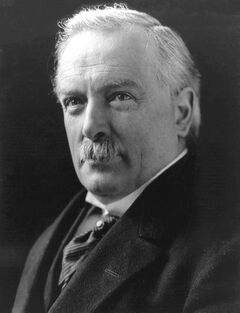More languages
More actions
David Lloyd George | |
|---|---|
 | |
| Born | 17 January 1863 Chorlton-on-Medlock, Manchester, England |
| Died | 26 March 1945 (aged 82) Llanystumdwy, Wales |
| Nationality | British |
| Political orientation | Liberalism Imperialism |
| Political party | Liberal Party |
David Lloyd George was a British Politician for the Liberal Party who served as the party's last Prime Minister from December 1916 to 1922. During the First World War he was invited to form a coalition government which lasted until 1922 when it collapsed, and the Conservatives took full control under Bonar Law.[1]
Early Life[edit | edit source]
Lloyd George, although born in Manchester, grew up in Caernarvonshire under the care of his uncle, who was a cobbler. He studied at the village school, learning Latin and French in order to qualify for legal training.[1]
Political career[edit | edit source]
In 1890 he was elected Liberal MP for Caernarvon, aged 27.[1]
In 1906 he was made President of the Board of Trade, and became recognised as a very able politician. Herbert Henry Asquith later promoted him to Chancellor where he introduced state pensions for the first time.[1]
His reforming budget only passed after the 1911 Parliament Act greatly weakened the power of the House of Lords to block legislation from the Commons. During the war, he was appointed Minister for Munitions, organising the war effort.[1]
Premiership[edit | edit source]
Lloyd George accepted an invitation to form a government in December 1916 successfully centralising the government machine. When the war ended he was acclaimed as the man who had won the war, and in 1918 the coalition won a huge majority in the first election which allowed women to vote. In 1919 he signed the Treaty of Versailles, which established the League of Nations and the war reparations settlement.[1]
His popularity faded as he faced scandals such as the allegation of selling honours, and domestic problems such as depression, unemployment and strikes. He was eager for war with Turkey when they fought for their independence against European imperialism but he was even more eager for his bloodthirsty campaign in Ireland when the Irish fought for their independence from British imperialism. He agreed to the independence of southern Ireland very reluctantly after the failure of his campaign. [1]
When the Conservatives broke up the coalition in 1922, he handed in his resignation.[1]
Post-Premiership[edit | edit source]
Lloyd George remained a very controversial figure; his own party could not decide whether to support him or abandon him. He largely disregarded the problems facing the party, preferring to work for himself, leaving him partly responsible for the party’s downfall. The Liberal party never ran the government again but Lloyd George himself later sped up the fall of Neville Chamberlain by attacking his failures during the Second World War.[1]
In 1944 he was created Earl Lloyd-George of Dwyfor, and died the following year aged 82.[1]
